一般将来时的用法练习答案解析(二)
英语一般将来时专题练习(及答案)含解析
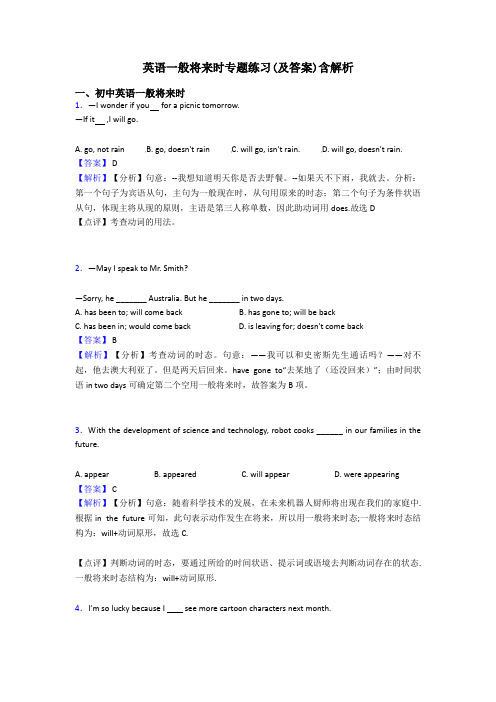
英语一般将来时专题练习(及答案)含解析一、初中英语一般将来时1.—I wonder if you for a picnic tomorrow.—If it ,I will go.A. go, not rainB. go, doesn't rainC. will go, isn't rain.D. will go, doesn't rain.【答案】 D【解析】【分析】句意:--我想知道明天你是否去野餐。
--如果天不下雨,我就去。
分析:第一个句子为宾语从句,主句为一般现在时,从句用原来的时态;第二个句子为条件状语从句,体现主将从现的原则,主语是第三人称单数,因此助动词用does.故选D【点评】考查动词的用法。
2.—May I speak to Mr. Smith?—Sorry, he _______ Australia. But he _______ in two days.A. has been to; will come backB. has gone to; will be backC. has been in; would come backD. is leaving for; doesn't come back【答案】 B【解析】【分析】考查动词的时态。
句意:——我可以和史密斯先生通话吗?——对不起,他去澳大利亚了。
但是两天后回来。
have gone to“去某地了(还没回来)”;由时间状语in two days可确定第二个空用一般将来时,故答案为B项。
3.With the development of science and technology, robot cooks ______ in our families in the future.A. appearB. appearedC. will appearD. were appearing【答案】 C【解析】【分析】句意:随着科学技术的发展,在未来机器人厨师将出现在我们的家庭中. 根据in the future可知,此句表示动作发生在将来,所以用一般将来时态;一般将来时态结构为:will+动词原形,故选C.【点评】判断动词的时态,要通过所给的时间状语、提示词或语境去判断动词存在的状态. 一般将来时态结构为:will+动词原形.4.I’m so lucky because I see more cartoon characters next month.A. is able toB. will be able toC. be able toD. was able to【答案】B【解析】【分析】句意:我真幸运因为我下个月能看到更多的卡通人物。
英语一般将来时专题练习(及答案)及解析
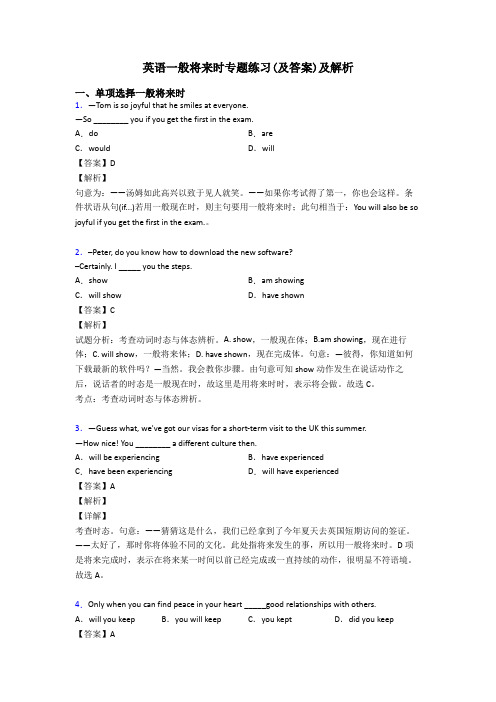
C.would have increasedD.will be increasing
【答案】B
【解析】
试题分析:考查时态。If条件句使用的是一般现在时代替一般将来时,所以主句也是一般将来时,和next year搭配使用。句意:如果我们的营销计划成功,我们明年销售将增加百分之三十。故B正确。
【解析】
句意为:——汤姆如此高兴以致于见人就笑。——如果你考试得了第一,你也会这样。条件状语从句(if...)若用一般现在时,则主句要用一般将来时;此句相当于:You will also be so joyful if you get the first in the exam.。
2.–Peter, do you know how to download the new software?
19.If he ________ exercise, he______ healthy.
A.not; will B.isn’t; won’t be
C.doesn’t; will be D.doesn’t do; won’t be
【答案】D
【解析】
【详解】
考查if条件句中的时态。句意:如果他不做运动,他就不会健康。If条件句,如果主句用一般将来时态,则从句用一般现在时态,且句子主语是he,单数第三人称,故选D。
考点:考查时态
10.It is required that the students _____ mobile phones in their school, so seldom _____ them using one.
A.should not use; you will see
一般将来时讲解及练习(含答案)
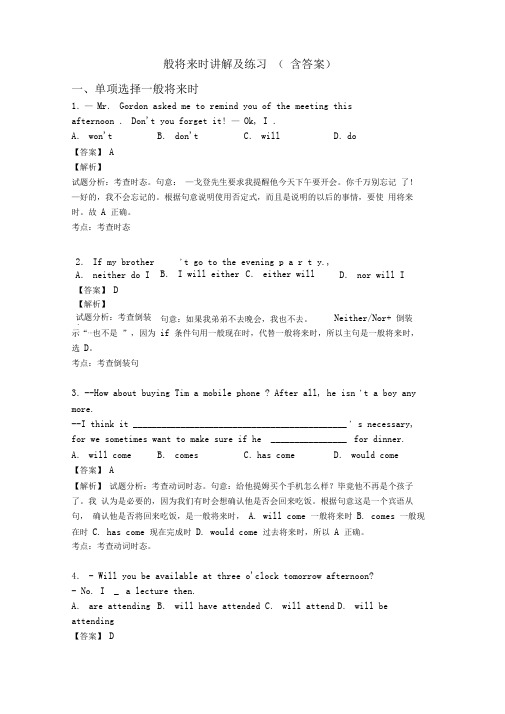
般将来时讲解及练习(含答案)一、单项选择一般将来时1.—Mr.Gordon asked me to remind you of the meeting thisafternoon .Don't you forget it! —Ok, I .A.won't B.don't C.will D.do【答案】A【解析】试题分析:考查时态。
句意:—戈登先生要求我提醒他今天下午要开会。
你千万别忘记了!—好的,我不会忘记的。
根据句意说明使用否定式,而且是说明的以后的事情,要使用将来时。
故A 正确。
考点:考查时态2.If my brother doesn 't go to the evening p a r t y.,A.neither do I B.I will either C.either willI D.nor will I【答案】D 【解析】试题分析:考查倒装句:句意:如果我弟弟不去晚会,我也不去。
Neither/Nor+ 倒装句,表示“⋯也不是”,因为if 条件句用一般现在时,代替一般将来时,所以主句是一般将来时,选D。
考点:考查倒装句3.--How about buying Tim a mobile phone ? After all, he isn 't a boy any more.--I think it _____________________________________________ ' s necessary, for we sometimes want to make sure if he ________________ for dinner. A.will come B.comes C.has come D.would come【答案】A【解析】试题分析:考查动词时态。
句意:给他提姆买个手机怎么样?毕竟他不再是个孩子了。
我认为是必要的,因为我们有时会想确认他是否会回来吃饭。
【英语】英语一般将来时答题技巧及练习题(含答案)含解析

【英语】英语一般将来时答题技巧及练习题(含答案)含解析一、初中英语一般将来时1.—Do you know ______?—The day after tomorrow.A. when we visited the museumB. when we will visit the museumC. when did we visit the museumD. when will we visit the museum【答案】 B【解析】【分析】句意:——你知道我们什么时候参过博物馆吗?——后天。
Do you know 后接宾语从句,应使用陈述结构,因此排除C和D,根据答语The day after tomorrow.可知问句使用一般将来时,故答案是B。
【点评】考查宾语从句的语序各时态,注意宾语从句使用陈述语序,根据答语确定问句的时态。
2.I’m so lucky because I see more cartoon characters next month.A. is able toB. will be able toC. be able toD. was able to【答案】B【解析】【分析】句意:我真幸运因为我下个月能看到更多的卡通人物。
next month表将来,因此用will be able to。
故选B。
【点评】考查一般将来时。
3.—Do you know when Mrs. White for dinner this evening?—No, but I think she when she is free.A. will come; will comeB. will come; comesC. comes; will come【答案】 A【解析】【分析】句意:——你知道怀特太太今晚是否来吃晚饭吗?——不知道。
但我认为如果她有空,她会来。
空一,句子为含有宾语从句的主从复合句,主句是一般现在时,从句用它所需要的任何时态,根据this evening今晚,可知句子为一般将来时,will come;空二,回答是when引导的时间状语从句,从句是一般现在时,主句应用将来时,will come,故选A。
英语一般将来时答题技巧及练习题(含答案)含解析
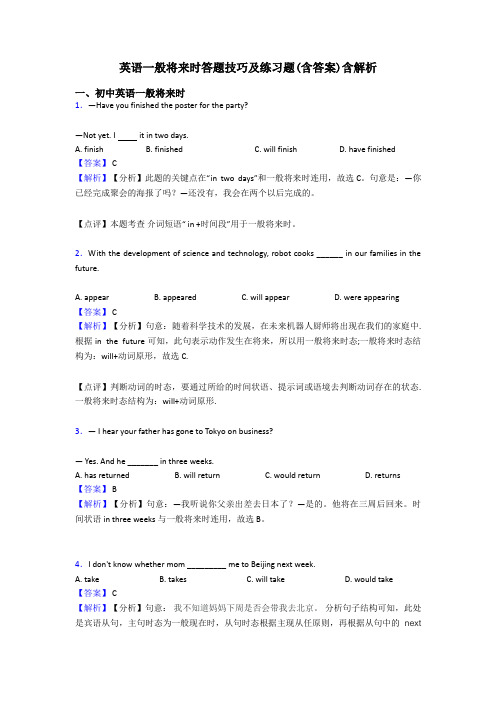
英语一般将来时答题技巧及练习题(含答案)含解析一、初中英语一般将来时1.—Have you finished the poster for the party?—Not yet. I it in two days.A. finishB. finishedC. will finishD. have finished【答案】 C【解析】【分析】此题的关键点在“in two days”和一般将来时连用,故选C。
句意是:—你已经完成聚会的海报了吗?—还没有,我会在两个以后完成的。
【点评】本题考查介词短语“ in +时间段”用于一般将来时。
2.With the development of science and technology, robot cooks ______ in our families in the future.A. appearB. appearedC. will appearD. were appearing【答案】 C【解析】【分析】句意:随着科学技术的发展,在未来机器人厨师将出现在我们的家庭中. 根据in the future可知,此句表示动作发生在将来,所以用一般将来时态;一般将来时态结构为:will+动词原形,故选C.【点评】判断动词的时态,要通过所给的时间状语、提示词或语境去判断动词存在的状态. 一般将来时态结构为:will+动词原形.3.— I hear your father has gone to Tokyo on business?— Yes. And he _______ in three weeks.A. has returnedB. will returnC. would returnD. returns【答案】 B【解析】【分析】句意:—我听说你父亲出差去日本了?—是的。
他将在三周后回来。
时间状语in three weeks与一般将来时连用,故选B。
4.I don't know whether mom _________ me to Beijing next week.A. takeB. takesC. will takeD. would take【答案】 C【解析】【分析】句意:我不知道妈妈下周是否会带我去北京。
【英语】一般将来时练习题二(解析

【英语】一般将来时练习题二(解析一、单项选择一般将来时1.Peace is necessary to all. After all, it is the United States and China, as the two largest economies in the world, that ________ most from a peaceful and stable Asia-Pacific.A.are benefited B.will benefitC.will be benefited D.had benefited【答案】B【解析】试题分析:根据语境“美国和中国将受益于一个和平稳定的亚太地区”可知该句要用一般将来时,故选B。
考点:考查时态2.However hard he tries,the recorder .A.didn’t work B.won’t work C.isn’t working D.hasn’t worked 【答案】B【解析】试题分析:考查will用法。
句意:无论他多么努力尝试,这个录音机就不工作了。
本题中的will表示的是一种倾向性,如The door won’t open.故B正确。
考点:考查will用法点评:情态动词will有多种不同的用法,will可以表示临时决定做某事;或者表示将来时。
3.—Did you tell your parents about the result?—Oh, no, I forgot. I them now.A.will be calling B.will call C.am going to tell D.am to call【答案】B【解析】句意:A 选项是将来进行时,表示将来某个时间正在进行的动作;B、C、D均表示一般将来时。
will+v原形表示临时决定的;而be going to do和be to do是表示按计划或安排要做的事。
一般将来时讲解(附习题+答案)

一般将来时讲解(附习题+答案)一、一般将来时的含义:表示动作发生在将来二、一般将来时的句型:(1) will/shall+动词原形(2) be going to+动词原形三、一般将来时的时间状语:tomorrow(明天)、the day after tomorrow(后天)、next...(下一...): next week(下一周)、next year(明年)、next month(下个月)in+一段时间(...之后): in three days(三天之后)、in the future在未来this evening(今天晚上)四、一般将来时的句型结构:(1) will/shall+动词原形(will not =won’t)(will 各种人称均可用,shall 只能用于第一人称)1)肯定句:主语+will/shall+动词原型...如:I will go to school tomorrow.我明天将会去学校He will go to school tomorrow.他明天将会去学校。
2)否定句:主语+will/shall+not+动词原型...如:I won’t go to school tomorrow.我明天将不会去学校。
He won’t go to school tomorrow.他明天将不会去学校。
3)一般疑问句:Will/Shall +主语+动词原型...如:Will you go to school tomorrow?你明天要去学校吗?Will he go to school tomorrow?他明天要去学校吗?肯定回答:Yes, 主语+will.如:Yes, I will.Yes, he will.否定回答:No,主语+will+not.如:No, I won’t.No, he won’t.4) 特殊疑问句:特殊疑问词+will/shall+主语+动词原型...如:What will you do tomorrow?你明天将会做什么?What will he do tomorrow?他明天将会做什么?(2) be going to+动词原形1)肯定句:主语+be going to +动词原型...如:I am going to buy some books tomorrow.我明天打算去买一些书。
一般将来时知识点总结(2)
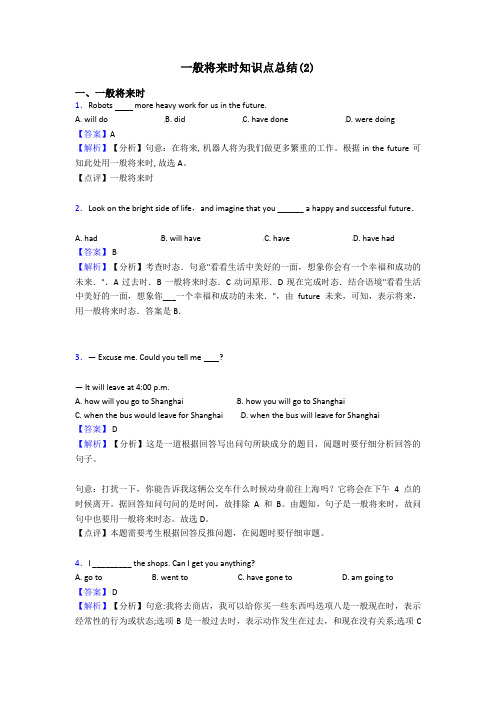
一般将来时知识点总结(2)一、一般将来时1.Robots more heavy work for us in the future.A. will doB. didC. have doneD. were doing【答案】A【解析】【分析】句意:在将来, 机器人将为我们做更多繁重的工作。
根据in the future 可知此处用一般将来时, 故选A。
【点评】一般将来时2.Look on the bright side of life,and imagine that you ______ a happy and successful future.A. hadB. will haveC. haveD. have had【答案】 B【解析】【分析】考查时态.句意"看看生活中美好的一面,想象你会有一个幸福和成功的未来.".A过去时.B一般将来时态.C动词原形.D现在完成时态.结合语境"看看生活中美好的一面,想象你___一个幸福和成功的未来.",由future未来,可知,表示将来,用一般将来时态.答案是B.3.— Excuse me. Could you tell me ?— It will leave at 4:00 p.m.A. how will you go to ShanghaiB. how you will go to ShanghaiC. when the bus would leave for ShanghaiD. when the bus will leave for Shanghai【答案】 D【解析】【分析】这是一道根据回答写出问句所缺成分的题目,阅题时要仔细分析回答的句子。
句意:打扰一下,你能告诉我这辆公交车什么时候动身前往上海吗?它将会在下午4点的时候离开。
据回答知问句问的是时间,故排除A和B。
由题知,句子是一般将来时,故问句中也要用一般将来时态。
(完整版)英语将来时态讲解、练习、答案

将来时表示法一般将来时表示在将来某个时间要发生的动作或存在的状态。
表示“将来”的句式很多,常用的句式及用法归纳如下:一、be going to+动词原形(专题与will的区别)1.这种结构表示主体现在打算在最近或将来要做某事。
这种打算往往是事先考虑好的。
如:My brother is going to learn English next year. 我哥哥准备明年学英语。
I am going to meet Tom at the station at six. 我六点钟要到火车站去接汤姆。
2.这种结构还可以表示说话人根据已有的迹象认为非常可能即将发生某事。
如:Look at these black clouds——it is going to rain. 看这些乌云——要下雨了。
I’m afraid I’m going to have a bad cold. 恐怕我要得重感冒了。
注意:1. 如果be going to后接的是形容词或副词(there)时,其后应加上be,然后再接形容词或副词。
如:I’m going to be busy this Sunday. 这个星期天我很忙2. there be句型也可用于这种句型中,但there不能和have连用。
如:There is going to be an English film this evening. 今天晚上有一场英文电影。
二、shall/ will+动词原形。
在书面语中,第一人称常用shall, 但在口语中,所有人称都可用will.1.will/ shall均可表示单纯的将来。
如:The radio says it will be cloudy tomorrow. 收音机报道明天多云。
2.表示预料中将要发生的动作或情况。
如:You’ll feel better after having this medicine.吃了这药,你就会感到好些的。
一般将来时练习题和答案解析

一般将来时(附练习题及答案)一般将来时(The future indefinite tense)一般将来时主要有以下几种表现形式:由助动词shall或will加动词原形构成,shall 用于第一人称,will 用于第二、三人称。
除英国外的说英语的国家,在陈述句中,即使在第一人称一般也用will,在英国也有这种趋势。
在口语中,常用shall, will的缩写形式为’ll, 如:I’ll, you’ll等。
Shall not的缩写式为:shan’t, will not 的缩写式为:won’t.肯定句:I/We shall/will go.You/He/She/They Will go.否定句:I/We shall/will not go.You/He/She/They Will not go.疑问句:Shall I/we goWill you/he/she/they go什么叫做一般将来时(1)一般将来时表示将要发生的动作或情况。
例如:I will(shall) arrive tomorrow.我明天到。
Will you be free tonight 你今晚有空吗We won’t (shan’t) be busy this evening. 我们今晚不忙。
(2)在一般将来时的句子中,有时有表示将来时间的状语,有时没有时间状语,这时要从意思上判断是否指未来的动作或情况。
例如:Will she come 她(会)来吗We’ll only stay for two weeks. 我们只待两星期。
The meeting won’t last long. 会开不了多久。
(3)在以第一人称I或we作主语的问句中,一般使用助动词shall,这时或是征求对方的意见(a),或是询问一个情况(b):a. Where shall we meet 我们在哪儿碰头b. Shall we have any classes tomorrow明天我们有课吗在这类问句中,近年来也有不少人用will,特别是在美国。
一般将来时练习题及答案学习 (2)

一般将来时用法:一般将来时表示将来某一时刻的动作或状态,其表达形式除了“s h a l l(第一人称),w i l l(第二、三人称)+动词原形构成”外,还有以下几种形式。
一.“b e g o i n g t o+动词原形”表示即将发生的或最近打算进行的事。
例如:①I t i s g o i n g t o r a i n.要下雨了。
②W e a r e g o i n g t o h a v e a m e e t i n g t o d a y.今天我们开会。
二.g o,c o m e,s t a r t,m o v e,s a i l,l e a v e,a r r i v e,s t a y,l i v e,f l y,等可用进行时态表示按计划即将发生的动作,例如:3.S h a l l w e g o t h e r e a t f i v e?我们五点钟去那儿,好吗?4.W i l l y o u p l e a s e o p e n t h e d o o r?请你把门打开,好吗?二、用b e g o i n g t o结构表示。
“b e g o i n g t o+动词原形”用来表示近期或事先考虑过的将要发生的动作以及已有迹象表明必将发生某事,意为“打算;就要”。
如:1.W e'r e g o i n g t o m e e t o u t s i d e t h e s c h o o l g a t e.我们打算在校门口见面。
2.L o o k!I t's g o i n g t o r a i n.瞧!快下雨了。
三、用现在进行时表示。
表示位置转移的动词(如:g o,c o m e,l e a v e,s t a r t,a r r i v e 等),可用现在进行时表示将来时。
如:1.U n c l e W a n g i s c o m i n g.王叔叔就要来了。
中考语法复习 一般将来时(附中考真题及解析)

中考语法复习一般将来时(附中考真题及解析)一、一般将来时1.概念:一般将来时表示将来某一时刻的动作或状态,或将来某一段时间内经常的动作或状态。
2.一般将来时的三种意义:预测(prediction):表示说话人认为将会发生某件事,即是表示猜测将来某事发生的可能性如:It will rain later.一会会下雨。
事先计划(future plan):表示说话人在头脑里已经决定好将来要做某件事如:My holiday is so long , and I am going to travel.意愿(willingness):表示说话人既不是预计某事将会发生,也不是预计经过考虑决定将做某事,而是在说话的时刻立即表明他将去做某事如:Someone is knocking at the door, I will go and open it.二、一般将来时结构一般将来时常常和表示将来的时间状语连用。
英式英语第一人称用shall,第二、三人称用will,而美式英语则不管什么人称,一律用will。
如:tomorrow(明天),next week(下周),from now on(从现在开始);in the future(将来)等。
⒈主语+ be going to do 表示主观的打算或计划。
⒉主语+ shall/will + do sth 其否定式shall not 和will not 的缩写式分别为shan't 和won't。
⒊ be 主语+ to do 表示客观安排或受人指示做某事或已安排好要在将来发生的事,是比较正式的用法。
如:They are to go on a strike on July 8.She is to be married next month.You are to finish your homework before you go to play.⒋主语+ be about to do,意为马上作某事,不能与tomorrow,next week 等表示明确将来时的时间状语连用,意思为“正要,马上就要”。
(英语)英语一般将来时练习题含答案含解析
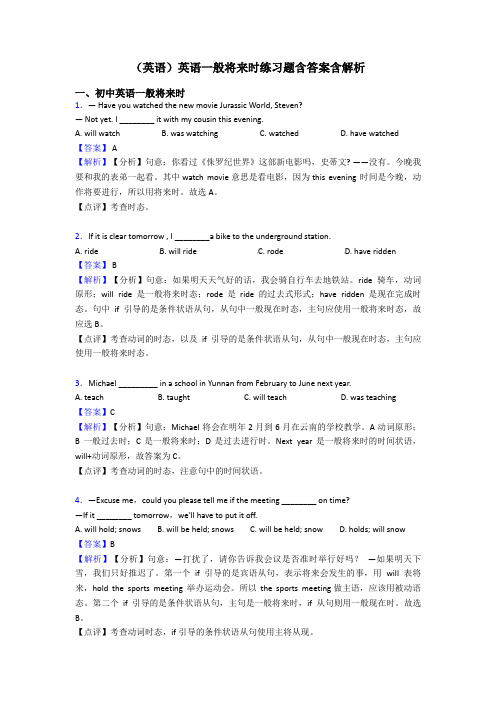
(英语)英语一般将来时练习题含答案含解析一、初中英语一般将来时1.— Have you watched the new movie Jurassic World, Steven?— Not yet. I ________ it with my cousin this evening.A. will watchB. was watchingC. watchedD. have watched【答案】 A【解析】【分析】句意:你看过《侏罗纪世界》这部新电影吗,史蒂文? ——没有。
今晚我要和我的表弟一起看。
其中watch movie意思是看电影,因为this evening 时间是今晚,动作将要进行,所以用将来时。
故选A。
【点评】考查时态。
2.If it is clear tomorrow , I ________a bike to the underground station.A. rideB. will rideC. rodeD. have ridden【答案】 B【解析】【分析】句意:如果明天天气好的话,我会骑自行车去地铁站。
ride骑车,动词原形;will ride是一般将来时态;rode是ride的过去式形式;have ridden是现在完成时态。
句中if引导的是条件状语从句,从句中一般现在时态,主句应使用一般将来时态,故应选B。
【点评】考查动词的时态,以及if引导的是条件状语从句,从句中一般现在时态,主句应使用一般将来时态。
3.Michael _________ in a school in Yunnan from February to June next year.A. teachB. taughtC. will teachD. was teaching【答案】C【解析】【分析】句意:Michael将会在明年2月到6月在云南的学校教学。
A动词原形;B一般过去时;C是一般将来时;D是过去进行时。
高中英语一般将来时解题技巧及练习题(含答案)含解析
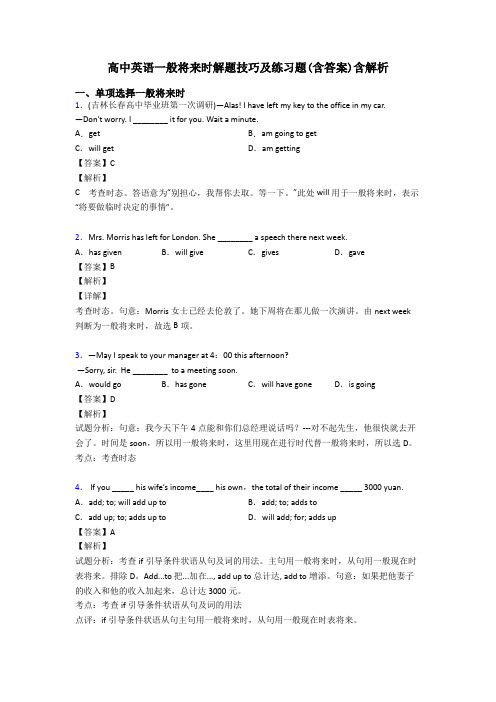
高中英语一般将来时解题技巧及练习题(含答案)含解析一、单项选择一般将来时1.(吉林长春高中毕业班第一次调研)—Alas! I have left my key to the office in my car.—Don't worry. I ________ it for you. Wait a minute.A.get B.am going to getC.will get D.am getting【答案】C【解析】C考查时态。
答语意为“别担心,我帮你去取。
等一下。
”此处will用于一般将来时,表示“将要做临时决定的事情”。
2.Mrs. Morris has left for London. She ________ a speech there next week.A.has given B.will give C.gives D.gave【答案】B【解析】【详解】考查时态。
句意:Morris女士已经去伦敦了。
她下周将在那儿做一次演讲。
由next week 判断为一般将来时,故选B项。
3.—May I speak to your manager at 4:00 this afternoon?—Sorry, sir. He ________ to a meeting soon.A.would go B.has gone C.will have gone D.is going【答案】D【解析】试题分析:句意:我今天下午4点能和你们总经理说话吗?---对不起先生,他很快就去开会了。
时间是soon,所以用一般将来时,这里用现在进行时代替一般将来时,所以选D。
考点:考查时态4.If you _____ his wife’s income____ his own,the total of their income _____ 3000 yuan. A.add; to; will add up to B.add; to; adds toC.add up; to; adds up to D.will add; for; adds up【答案】A【解析】试题分析:考查if引导条件状语从句及词的用法。
英语中一般将来时的总结与练习题

英语中一般将来时的总结与练习题一、一般将来时的总结1. 一般将来时的定义一般将来时表示将来某个时间要发生的动作或存在的状态,也常用于表示将来一段时间内的经常性动作或状态。
在英语中,一般将来时主要由助动词“will”或“shall”(第一人称)加动词原形构成。
此外,“be going to + 动词原形”也可表示将来时,常用于根据目前已知的情况预测未来即将发生的动作或状态。
2. 一般将来时的常见形式•“will + 动词原形”•“shall + 动词原形”(第一人称)•“be going to + 动词原形”•“be to do”结构(表示按计划或安排即将发生的动作)•“be about to + 动词原形”(表示即将发生的动作,不能与表示将来的时间状语连用)3. 一般将来时的用法•表示将来的动作或状态,通常与表示将来的时间状语连用,如“tomorrow”, “next year”, “in the future”等。
•表示根据现有情况推测未来可能发生的动作或状态,常用于“be going to”结构中。
•表示计划、安排或打算做的事情,常与“be to do”结构连用。
4. 与其他时态的区别•与现在进行时区别:现在进行时表示正在进行的动作,而一般将来时表示将来某个时间要发生的动作。
•与现在完成时区别:现在完成时表示过去发生的动作对现在造成的影响或结果,而一般将来时则表示未来即将发生的动作。
二、一般将来时的练习题1. 选择题(1) —_____ you _____ a party next weekend?—Yes, we will.A. Will; haveB. Are; havingC. Do; haveD. Are; go to have(2) They _____ a meeting this afternoon.A. are havingB. are going to haveC. will havingD. will have(3) —_____ you _____ your homework before you watch TV?—Yes, I _____.A. Will; do; willB. Are; doing; amC. Are; going to do; amD. Will; do; am2. 填空题(1) I _____ (meet) my friend at the airport tomorrow.(2) They _____ (not go) to the zoo if it rains.(3) We _____ (have) a picnic next Sunday. Will you join us?3. 翻译题(1) 明天我要去看望我的祖父母。
一般将来时专项练习题及答案详解
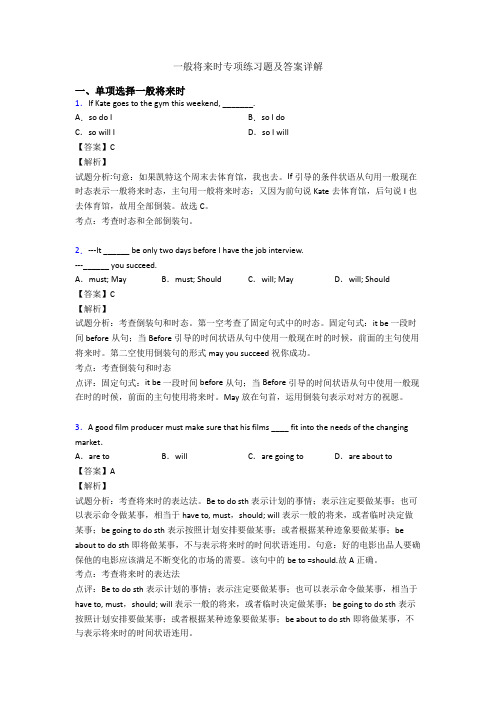
一般将来时专项练习题及答案详解一、单项选择一般将来时1.If Kate goes to the gym this weekend, _______.A.so do I B.so I doC.so will I D.so I will【答案】C【解析】试题分析:句意:如果凯特这个周末去体育馆,我也去。
If引导的条件状语从句用一般现在时态表示一般将来时态,主句用一般将来时态;又因为前句说Kate去体育馆,后句说I也去体育馆,故用全部倒装。
故选C。
考点:考查时态和全部倒装句。
2.---It ______ be only two days before I have the job interview.---______ you succeed.A.must; May B.must; Should C.will; May D.will; Should【答案】C【解析】试题分析:考查倒装句和时态。
第一空考查了固定句式中的时态。
固定句式:it be 一段时间 before从句;当Before引导的时间状语从句中使用一般现在时的时候,前面的主句使用将来时。
第二空使用倒装句的形式may you succeed祝你成功。
考点:考查倒装句和时态点评:固定句式:it be 一段时间 before从句;当Before引导的时间状语从句中使用一般现在时的时候,前面的主句使用将来时。
May放在句首,运用倒装句表示对对方的祝愿。
3.A good film producer must make sure that his films ____ fit into the needs of the changing market.A.are to B.will C.are going to D.are about to【答案】A【解析】试题分析:考查将来时的表达法。
Be to do sth表示计划的事情;表示注定要做某事;也可以表示命令做某事,相当于have to, must,should; will表示一般的将来,或者临时决定做某事;be going to do sth表示按照计划安排要做某事;或者根据某种迹象要做某事;be about to do sth即将做某事,不与表示将来时的时间状语连用。
英语一般将来时用法详解
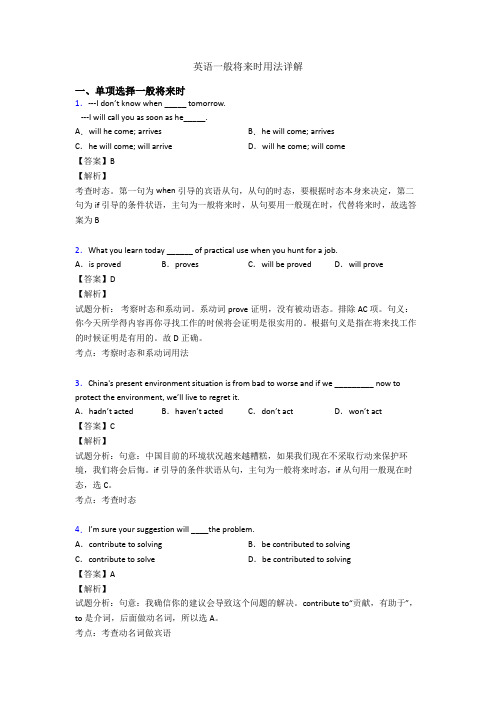
C.will be benefitedD.had benefited
【答案】B
【解析】
试题分析:根据语境“美国和中国将受益于一个和平稳定的亚太地区”可知该句要用一般将来时,故选B。
考点:考查时态
16.—Ann is in hospital.
—Oh, really? I ________ know. I ________ go and visit her.
【解析】
试题分析:句意:我确信你的建议会导致这个问题的解决。contribute to“贡献,有助于”,to是介词,后面做动名词,所以选A。
考点:考查动名词做宾语
5.The sky is clouding over;we can see there ________ a rainstorm.
A.is going to beB.is going to have
考点:f引导的条件状语从句句子时态的选择
14.--I have you asked John to come to the party this evening?
--Yes,I have,but he____
A.doesn'tB.hasn'tC.hadn'tD.won't
【答案】D
【解析】
试题分析:此处doesn't表示一般现在时;hasn't现在完成时;hadn't过去完成时;won't一般将来时,意为:不愿,表意愿。句意:—我让你请求John来参加今晚是聚会?—是的,我请了,但他不愿意来。根据句意选D。
A.am stayingB.have stayed
一般将来时讲解与练习(含答案)
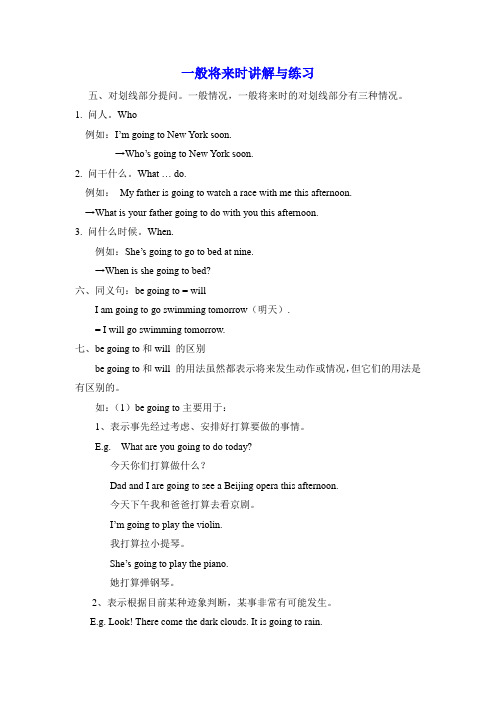
一般将来时讲解与练习五、对划线部分提问。
一般情况,一般将来时的对划线部分有三种情况。
1. 问人。
Who例如:I’m going to New York soon.→Who’s going to New York soon.2. 问干什么。
What … do.例如:My father is going to watch a race with me this afternoon.→What is your father going to do with you this aftern oon.3. 问什么时候。
When.例如:She’s going to go to bed at nine.→When is she going to bed?六、同义句:be going to = willI am going to go swimming tomorrow(明天).= I will go swimming tomorrow.七、be going to和will 的区别be going to和will 的用法虽然都表示将来发生动作或情况,但它们的用法是有区别的。
如:(1)be going to主要用于:1、表示事先经过考虑、安排好打算要做的事情。
E.g. What are you going to do today?今天你们打算做什么?Dad and I are going to see a Beijing opera this afternoon.今天下午我和爸爸打算去看京剧。
I’m going to play the violin.我打算拉小提琴。
Sh e’s going to play the piano.她打算弹钢琴。
2、表示根据目前某种迹象判断,某事非常有可能发生。
E.g. Look! There come the dark clouds. It is going to rain.瞧!乌云密集,天要下雨。
- 1、下载文档前请自行甄别文档内容的完整性,平台不提供额外的编辑、内容补充、找答案等附加服务。
- 2、"仅部分预览"的文档,不可在线预览部分如存在完整性等问题,可反馈申请退款(可完整预览的文档不适用该条件!)。
- 3、如文档侵犯您的权益,请联系客服反馈,我们会尽快为您处理(人工客服工作时间:9:00-18:30)。
一般将来时的用法
1. Charlie ______ here next month.
A. works
B. worked
C. will work
D. is working
参考答案:C
next month的意思是“下个月”,表示“将来要发生的动作或情况”要用一般将来时,故正确答案为C。
2. How ______ your holidays?
A. are you going to spend
B. do you spend
C. are you spending
D. did you spend
参考答案:A
表示“计划做某事”用一般将来时,并且通常用be going to的结构,故正确答案为A。
3. We ______ the result soon.
A. knows
B. shall know
C. knew
D. is knowing
参考答案:B
soon要用一般将来时,当主语是第一人称时可以用shall do的结构,故正确答案为B。
4. 按要求改写下列句子。
- Shall I come again tomorrow afternoon?(作肯定回答)
- ______ .
参考答案:Yes,please
在一般将来时中,当主语是第一人称时,常用shall,当shall用于第一人称征求对方的意见时,做肯定回答时应该用yes,please,故正确答案为Yes,please。
5. - Shall I buy a cup of tea for you?
- ______ .(不,不要。
)
A. No, you won’t
B. No, you aren’t
C. No, please don’t
D. No, please
参考答案:C
当shall用于第一人称征求对方的意见时,做否定回答时应该用No,please don’t,故正确答案为C。
6. Don't worry about the exam. I'm sure you ______ .
A. pass
B. will pass
C. passed
D. is passing
参考答案:B
“I expect,I’m sure,I think,I wonder”等的宾语从句通常用一般将来时,故正确答案为B。
7. Work hard and you ______ .
A. will succeed
B. succeeded
C. succeed
D. is succeeding
参考答案:A
祈使句的并列句中通常用一般将来时,故正确答案为A。
8. The bus ______ ______ .Please wait for a minute. (come)
参考答案:is coming
go,come,leave,arrive等表示位置转移的动词,用现在进行时be doing表示将来时,故该题答案为is coming。
9. Mary will come back ______ two hours.
A. in
B. since
C. for
D. later
参考答案:A
该句用的是一般将来时,而two hours又是“一段时间”,因此应该用in。
in+一段时间用一般将来时。
故正确答案为A。
10. There ______ a birthday party this Sunday.
A. shall be
B. will be
C. shall going to be
D. will going to be
参考答案:B
this Sunday要用一般将来时,will/shall后面都要加动词原形,因此排除C、D,而shall通常与第一人称连用,故正确答案为B。
11.用括号中所给单词的适当形式完成句子。
When I grow up, I ______ a nurse and look after patients. (be)
参考答案:will be
时间状语从句的从句用一般现在时,而主句是用一般将来时,所以该空应用一般将来时,故该空应填will be。
12. Jim ______ to the zoo if it doesn’t rain tomorrow.
A. is going
B. shall go
C. goes
D. will go
参考答案:D
if引导的条件状语从句中,主句常用一般将来时,因此排除A、C,而shall的主语通常是第一人称,故正确答案为D。
